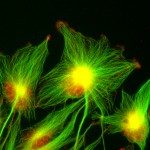Lien vers Pubmed [PMID] – 24997300
Curr. Opin. Cell Biol. 2014 Oct;30:51-9
The collective migration of sheets, cohorts, chains or streams of cells contributes to embryogenesis, tissue remodeling and repair as well as to cancer invasion. The functional coordination between neighboring cells is at the heart of collective migration, during which cells migrate with a similar speed in an identical direction. Far from being the result of the simultaneous migration of isolated cells, collective migration relies on the intercellular communication between migrating cells. Although the mechanisms of cell coordination are far from being completely understood, accumulated evidence show that exchange of mechanical and chemical information by direct intercellular contacts and by soluble extracellular signals orchestrate the coordinated behavior of collectively migrating cells.

